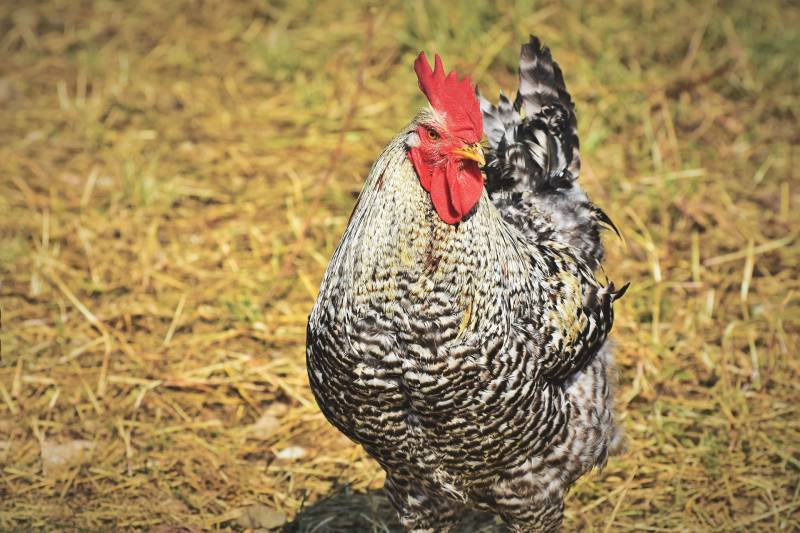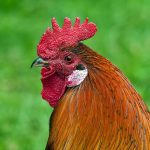Quick Navigation
If your chicken can’t stand up or walk, you have a serious issue.
Chickens love to wander as they look for food.
Therefore, if it’s not broody, you will have to examine it closely.
Typically, a chicken can fail to stand or walk because of an injury or sickness.
If you rear lots of chickens in one coop, then there’s a high chance of your chicken injuring one another.

Alternatively, your chicken may fail to stand up or move because of dehydration.
If you have a chicken with this problem, we have highlighted the possible causes and how to go about it.
Hence, continue reading to know why your chicken can’t stand up or move.
Injury
The first thing to do if your chicken can’t walk or stand up is to find out if it’s injured.
Examine its entire body as you look for bruises, broken bones, and wounds.
Being a prey animal, a chicken won’t be able to move when it feels extreme pain.
What To Do
In this case, you don’t need to rush it to the vet if it’s not badly injured.
The priority should be separating it from the flock into a separate cage.
This will prevent the injured or wounded chicken from being bulled.
Also, other chickens won’t worsen the wound as they fight for food or water.
Besides, separating the injured chicken will help to prevent it from contracting a contagious disease.
Make sure the chicken coop where you’re isolating it is peaceful and warm.
This is very crucial for quick healing. If the wound is severe and beyond you, get a veterinarian to treat it.
Dehydration
Another overlooked reason why chickens fail to stand up or walk is dehydration.
The chicken may become dehydrated if it’s not taking water. Examine the chicken’s crop.
If the crop is empty, you may have to hand-feed it wet food.
But if the crop is impacted because of the chicken not getting enough water, you should give it some water.
What To Do
If your chicken has an empty crop, feed it wet food.
But if the crop is impacted, provide it with water.
An impacted crop usually feels like a hard lump on the chicken’s right side close to the base of the neck.
Don’t feed a chicken with a hard lump. Instead, you should give it liquids.
After giving your chicken some water, massage the crop to break up the hardened lump.
Note that an impacted crop is a sign of dehydration.
Not only will dehydration cause issues in all body systems, but it can also cause major organ failure, seizures, or even death.
Therefore, you should always ensure that your chickens are properly hydrated to avoid suffocating them.
Diseases
Apart from injuries and dehydration, your chickens can also fail to walk or stand up because of sickness.
Various diseases can attack your chicken and impair them.
Most of these diseases affect the nervous system.
It may affect the brain, spinal cord, or particular nerves.
Some of these diseases include:
Epidemic Tremor
This virus is usually present in the droppings of infected poultry. Your chicken can get this disease by consuming food or drinking water that’s contaminated by infected droppings.
Likewise, epidemic tremors can be passed from hens to their chicks.
This is one of the ways through which small chicks get infected.
Some of the common signs of epidemic tremors include reduced egg production, but if it’s a small chick, it will have tremors and shivers.
Moreover, chicks will have trouble walking and standing up.
What To Do
Unfortunately, there’s no treatment for epidemic tremors.
A tiny chick will become paralyzed and die.
That’s why it’s recommended to get in touch with a vet to examine your sick chickens.
This disease shouldn’t be allowed to spread to other chickens as it may finish your flock.
The only solution is to vaccinate your birds.
Newcastle Disease
This is among the most lethal chicken diseases.
It is typically contaminated through droppings from sick chickens and sneezing in the air.
If healthy birds eat or drink contaminated food or water, respectively, they will get sick.
This virus can also survive in the air and it is easily transferred by people and tools.

Some of the common signs of Newcastle disease are difficulty walking, turning heads, trouble breathing, green diarrhea, and ruffled feathers.
What To Do
Like epidemic tremor, Newcastle disease does not have a cure.
However, you can vaccinate your chicken.
Botulism
Botulism is a disease that is characterized by paralysis of the neck and limbs of birds.
It is a toxin that’s caused by a germ.
The toxin is normally found in dead or rotting poultry and other carcasses.
If your chicken feeds on this toxin, they become infected.
Apart from being paralyzed, your chicken may also fail to walk and have a twisted head.
Additionally, the sick chicken may lose feathers around the neck.
What To Do
Treating this disease is simple. Provide your birds with large quantities of fresh and clean water.
It will help to get rid of the toxin or bacteria in the chicken’s body.
Alternatively, you can treat your chicken with penicillin.
Marek’s Disease
This is one of the most lethal diseases that your chicken can suffer from.
This virus usually attacks feathers. It can also survive feather dust in chicken houses.
Therefore, regular cleaning is needed to avoid the spread of this virus inside the chicken’s coop.
If you chicken contracts this disease, it will fail to walk, become paralyzed, lose weight, and even die.
What To Do
Unluckily, Marek’s disease doesn’t have any cure, but there are vaccines. So, ensure that your birds are vaccinated.
Final Thoughts
A dehydrated, injured, or sick chicken may fail to stand up or even walk.
However, you shouldn’t be worried as most of these issues can be handled.
If it’s sickness, you should ensure to see a chicken vet so that it can be checked and treated as soon as possible.
But if it’s due to injury, you should get the chicken treated and ensure that the chickens are not overcrowded in the chicken coop.
Additionally, you should provide your chickens with a diet full of calcium and minerals.
This helps to strengthen their bones and muscles.
Besides, food rich in supplements is also recommended.
With proper care, your chickens won’t have standing or walking problems.

Zoey is a long-time pet owner and animal rights advocate, a vital part of Purrfect n’ Pawesome. She shares her unique experiences and learnings with her readers to enhance their understanding of pet behavior and nutrition. Along with being an active pet writer, she volunteers at multiple animal shelters, rescue centres with some bespokenly awesome pets.
Zoey has a lot to share when raising the pets and spending life being their true friends. She has a quite pampered Persian cat and a Ragdoll, whom she loves the most. Readout her blogs to know more about being a responsible parent to your beloved pets.
“I love to be around cats and dogs; that’s my passion and my trick to get away from all the negativity and soaking in unconditional love and affection. Being attached to this platform gives me the reason to be vocal about pet love, care, and nurturing. Although I am not an expert or veterinarian by any means, I have a lot of experience and learnings to share with my fellow readers.”






